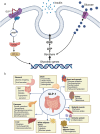Prognosticating post-bariatric surgery outcomes and management of postoperative recurrent weight gain and diabetes recurrence
- PMID: 39764413
- PMCID: PMC11700827
- DOI: 10.3389/fnut.2024.1510403
Prognosticating post-bariatric surgery outcomes and management of postoperative recurrent weight gain and diabetes recurrence
Abstract
Bariatric surgery stands as the most potent treatment for achieving substantial weight reduction and alleviating the complications associated with obesity. However, it is not the treatment of choice for patients with obesity combined with type 2 diabetes mellitus, and the benefit of bariatric surgery varies widely among individuals. There is a noticeable inconsistency in the outcomes following these procedures. The ability to predict how an individual will respond to bariatric surgery is a valuable asset in clinical practice. And the importance of postoperative interventions should not be underestimated. Proactive measures targeting both pre- and post-operative eating habits and lifestyle adjustments are of greater significance than the investigation into pre-operative factors alone. The judicious application of medication, endoscopic intervention and conversional surgeries after bariatric surgery can yield superior outcomes in managing recurrent weight regain and the recurrence of diabetes, albeit with consideration for the associated complication rates.
Keywords: bariatric surgery; conversional surgery; glucagon-like peptide-1; recurrent weight gain; type 2 diabetes mellitus.
Copyright © 2024 Xiao, Du, Tan and Ren.
Conflict of interest statement
The authors declare that the research was conducted in the absence of any commercial or financial relationships that could be construed as a potential conflict of interest.
Figures




Similar articles
-
Predicting Responses to Bariatric and Metabolic Surgery.Curr Obes Rep. 2020 Sep;9(3):373-379. doi: 10.1007/s13679-020-00390-1. Curr Obes Rep. 2020. PMID: 32542590 Review.
-
Endoscopic Management of Weight Regain After Bariatric Surgery.Gastrointest Endosc Clin N Am. 2024 Oct;34(4):639-654. doi: 10.1016/j.giec.2024.04.007. Epub 2024 May 10. Gastrointest Endosc Clin N Am. 2024. PMID: 39277296 Review.
-
Bariatric Surgery for Adults With Class I Obesity and Difficult-to-Manage Type 2 Diabetes: A Health Technology Assessment.Ont Health Technol Assess Ser. 2023 Dec 5;23(8):1-151. eCollection 2023. Ont Health Technol Assess Ser. 2023. PMID: 38130940 Free PMC article.
-
Pharmacotherapy before and after bariatric surgery.Metabolism. 2023 Nov;148:155692. doi: 10.1016/j.metabol.2023.155692. Epub 2023 Sep 18. Metabolism. 2023. PMID: 37730085 Review.
-
Clinical outcomes and adverse events of bariatric surgery in adults with severe obesity in Scotland: the SCOTS observational cohort study.Health Technol Assess. 2024 Jan;28(7):1-115. doi: 10.3310/UNAW6331. Health Technol Assess. 2024. PMID: 38343107 Free PMC article.
References
-
- Busetto L, Dicker D, Azran C, Batterham RL, Farpour-Lambert N, Fried M, et al. . Obesity management task force of the European Association for the Study of obesity released "practical recommendations for the post-bariatric surgery medical management". Obes Surg. (2018) 28:2117–21. doi: 10.1007/s11695-018-3283-z, PMID: - DOI - PubMed
Publication types
LinkOut - more resources
Full Text Sources

